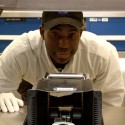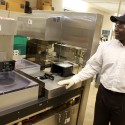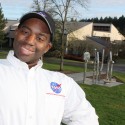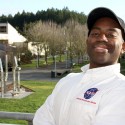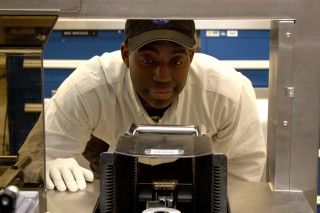This content was published: February 22, 2010. Phone numbers, email addresses, and other information may have changed.
Student’s selection launches work with NASA
Story by Meryl Lipman and photos by James Hill
Portland Community College student Damani Proctor has been selected one of 105 students nationwide for the NASA Student Ambassador Program.
Ambassadors will interact with the agency while sharing information, making professional connections and collaborating with peers. They also will represent NASA in a variety of venues and help the agency inspire and engage future interns and fellows. Proctor is working on his associate’s degree in Microelectronics Technology Program at the Rock Creek Campus. After college he aspires to use his two degrees to find work in the solar electronics industry.
“As a NASA scholar I am beyond words,” said Proctor, who lives in Gresham. “‘Amped’ is probably the closest word to describe it. My hope is a greater outlook on the future in NASA employment. NASA has great opportunities and there is a world of possibilities to explore.”
Last spring Proctor, 36, found out he’d been accepted to the Oregon Space Grants Program and was an intern at the Goddard Space Flight Center in Maryland. He spent three months testing, programming, and troubleshooting a system to convert power from 120 to 28 volts.
“The space station runs at 120 volts,” he explained. “But if you convert down to 28, you can run experiments from the shuttle bay.”
His work group, in which he was the only intern, created a prototype of the power conversion system, and it launched in late November. By then Proctor was back at PCC, where he found he’d been nominated as a NASA Student Ambassador. As he prepares to graduate this spring, he says he hopes to use the NASA appointment to recruit high school and college students to the various NASA programs by talking about his experiences and performing community outreach.
Proctor’s path to NASA started when he graduated from Embry Riddle Aeronautical University in 2002 and soon found full-time work at a call center four years ago, but within a year the company outsourced his job. Out of work, he became eligible for retraining at PCC and moved in with his parents to save money. But in 2007 their Portland home caught fire and the family dispersed.
He subsequently had a car accident and the drawn-out financial strain left him homeless for a short time before he found stable housing with friends in Gresham. Now he takes the MAX and bus more than two hours each way from Gresham to the Rock Creek Campus (17705 N.W. Springville Road) in Washington County, where the Microelectronics Technology program is housed.
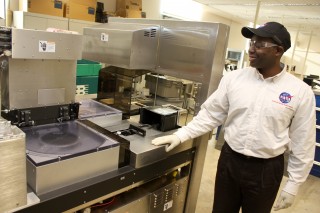
Proctor and his fellow students use these machines for their Microelectronics Technology Program class. They were donated by the Intel Corp.
The agency uses the program to engage undergraduate and graduate students in NASA science, technology, engineering and mathematics, research and interactive opportunities. Selected students represent 33 states and 81 college or universities from across the nation.
NASA managers and mentors nominated the recipients from the hundreds of interns and fellows engaged in research and education opportunities across the agency. The NASA Student Ambassadors initiative further recognizes exceptional students.
“To ensure success in meeting future exploration goals, the agency requires greater depth of knowledge and pursuit of innovation than ever before,” said Joyce Winterton, assistant administrator for Education at NASA headquarters in Washington, D.C. “NASA and the nation must adapt to the changing landscape and develop new strategies to cultivate its future workforce.”
For more information about the NASA Student Ambassadors, including a list of the new 2010 ambassadors, and an interactive map of the United States that identifies the current ambassadors, visit: intern.nasa.gov

